

Board Observers Weekly - April 22th, 2014. Apple and Nike. What kind of company is Apple, anyway?
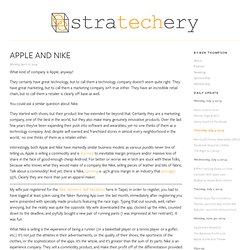
They certainly have great technology, but to call them a technology company doesn’t seem quite right. They have great marketing, but to call them a marketing company isn’t true either. They have an incredible retail chain, but to call them a retailer is clearly off base as well. You could ask a similar question about Nike. They started with shoes, but their product line has extended far beyond that.
Interestingly, both Apple and Nike have markedly similar business models: as various pundits never tire of telling us, Apple is selling a commodity and is doomed to inevitable margin pressure and/or massive loss of share in the face of good-enough cheap Android. My wife just registered for the Nike Women’s Half Marathon here in Taipei; in order to register, you had to have logged at least 50km using the Nike+ Running App over the last month; immediately after registering you were presented with specially made products featuring the race logo.
Do you Suffer from the Urgency Addiction? It’s More Common Than you Think. I suffer from the “urgency addiction.”
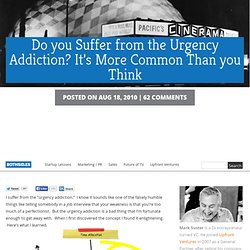
I know it sounds like one of the falsely humble things like telling somebody in a job interview that your weakness is that you’re too much of a perfectionist. But the urgency addiction is a bad thing that I’m fortunate enough to get away with. When I first discovered the concept I found it enlightening. Here’s what I learned. As individuals we have choices about how we spend our time. Here’s how I break down the four quadrants (and I’ve put my definitions in here – not Covey’s). In praise of unfairness. The complaint in both cases was that of course smartphone sales are bigger than PCs, but that's unfair - the phone market is just much bigger than the PC market (and the devices are replaced every ~2 years where PCs are replaced every ~5 years).
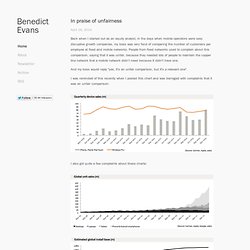
Plus, it's unfair to compare PCs with mobile devices because some of the things you do on PCs are hard to do on mobile devices (at least for now). These objections were quite correct - the comparison is unfair. But it's also relevant. Mobile is now around half of all time spent online in developed markets and will be the dominant global consumer computing platform of the next decade or two. And the sheer scale of the smartphone businesses is driving a reshaping of all the dynamics of the technology industry, while its supply chain is enabling all sorts of new segments that would never have been possible before - drones, wearables, VR, micro-satellites, internet-of-things devices and lots of other things besides.
What Happened to Yahoo. August 2010 When I went to work for Yahoo after they bought our startup in 1998, it felt like the center of the world.
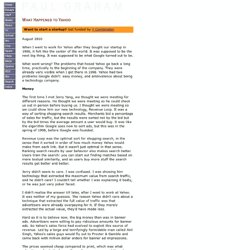
It was supposed to be the next big thing. It was supposed to be what Google turned out to be. What went wrong? The problems that hosed Yahoo go back a long time, practically to the beginning of the company. The first time I met Jerry Yang, we thought we were meeting for different reasons. Revenue Loop was the optimal sort for shopping search, in the sense that it sorted in order of how much money Yahoo would make from each link. Jerry didn't seem to care. I didn't realize the answer till later, after I went to work at Yahoo. Hard as it is to believe now, the big money then was in banner ads.
The prices seemed cheap compared to print, which was what advertisers, for lack of any other reference, compared them to. By 1998, Yahoo was the beneficiary of a de facto Ponzi scheme. The three kinds of platforms you meet on the Internet. [Title with sincere apologies to Mitch Albom and his wonderful book.]
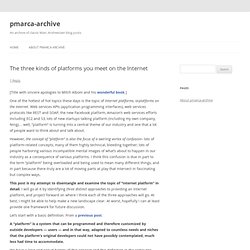
One of the hottest of hot topics these days is the topic of Internet platforms, orplatforms on the Internet. Web services APIs (application programming interfaces), web services protocols like REST and SOAP, the new Facebook platform, Amazon’s web services efforts including EC2 and S3, lots of new startups talking platform (including my own company, Ning)… well, “platform” is turning into a central theme of our industry and one that a lot of people want to think about and talk about. Believers vs non-believers. "I’d shut down Apple" - Michael Dell, 1997.
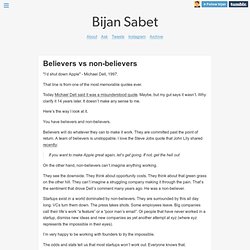
That line is from one of the most memorable quotes ever. Today Michael Dell said it was a misunderstood quote. Maybe, but my gut says it wasn’t. Why clarify it 14 years later. It doesn’t make any sense to me. Here’s the way I look at it. You have believers and non-believers. Believers will do whatever they can to make it work. If you want to make Apple great again, let’s get going. On the other hand, non-believers can’t imagine anything working. They see the downside. Startups exist in a world dominated by non-believers.